Posted on 8/10/2017
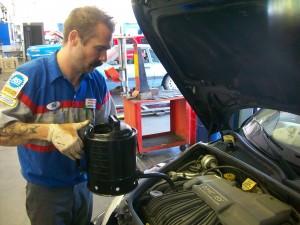
There's a lot of discussion about synthetic oils and if they're right for your car. We'd like to clear the air on this important topic. Synthetic oils have a lot of advantages, mainly because they are resistant to heat and pressure - the two biggest sources of engine stress. Oil, as a lubricant, exists to protect engine parts from heat and pressure and it takes a beating. Eventually, this heat and pressure reduces the oil's ability to protect the engine and it must be replaced. Also, your engine sucks in air, which has dirt and dust, and this makes its way into the engine. The oil filter keeps most of this away from engine parts but eventually, the oil filter becomes clogged. Depending on your driving habits, standard oil should be changed every 3,000 miles or so. The main advantage of synthetic oil is that it lasts longer and, while it's in your engine, it protects your engine better. It's been engineered to withstand heat and pressure much better than natural oil ... read more
Posted on 2/24/2013
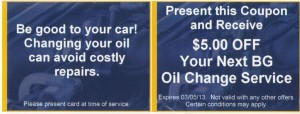
Click this coupon and print it for a $5 discount on your next oil change at Plantation Tune Tech An oil change at Plantation Tune Tech is better than another shop’s because we use BG products. In automotive, industrial, and heavy-equipment applications, the products of BG have shown themselves to be innovative, well made, protective of the environment, and attuned to the task at hand. They perform as promised. They do the job
Posted on 11/11/2012
People sometimes wonder why they should pay a little more for an oil change at an auto shop, when a quick-lube joint could change their oil for less. We do lots of oil changes, hundreds a year. Every now and then, during the course of an oil change, we find a more serious problem, something that could lead to an engine failure. The kind of thing that makes your engine stop on the freeway without warning. We discover these things and give our best assessment of what's at stake and how to fix it. Sometimes, the fix is simple and other times not. But the point is these problems would most likely be overlooked at one of the quick-lube business. When we do an oil change, we have a trained, experienced technician look for a variety of potential problems in the engine, transmission, suspension, exhaust, drive train and more. Staff at a quick-lube place don't have the training, time or interest in the overall car. Their job is to change your oil; ours is to assure reliability, over ... read more
Posted on 10/26/2012
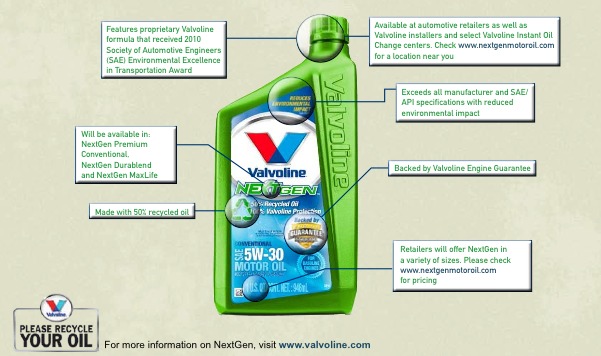
We change about 438 gallons of oil a year, all of which is recycled, mostly into heating oil. We'd love to have a way to put that oil to better use and Valvoline now has a product, NextGen, which is 50 percent recycled oil, and we are pleased to offer it to our customers. We are eager to adopt environmentally friendly practices that offer at least the equal benefit of standard products. This review at Green Auto Blog sums it up pretty well. Motor oil is 85 percent oil and 15 percent additives. When motor oil wears out, it's the additives that need replacing and the oil itself is fine. Valvoline's process removes the carbon, impurities and spent additives and returns the oil to its refined condition, then restores the additives. Even virgin oil is recycled, because crude oil is in an extremely impure state and it's only through refining that it attains the purity needed for engin ... read more
Posted on 4/6/2012
Care and Maintenance Tips Keep Your Car Running in Top-Notch ConditionWe've compiled our best expert advice, surprising tricks, and car care tips to prolong the life of your automobile! 1. Be patient during the break-in period You've bought your dream car and now you want to make it last at long as possible in top condition. Here are some things to remember as you pull it out of the dealer's lot: During the break-in period, typically the first 1,000 miles (1,600 km), keep your speed under 55 mph (88 kpm) or to the speed recommended by your car's manufacturer. Avoid heavy loads on the drive train, such as towing trailers, and loading the roof rack or trunk with heavy construction materials. Do not allow your new car to idle for long periods - this is good advice for the life of your car, but especially during breakin. The oil pressure generated by doing so may not be sending oil to every part of your engine. Use only ligh ... read more
Posted on 3/16/2012
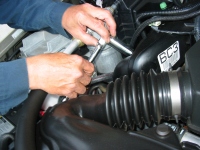
Keep Your Engine Properly Tuned Fixing a car that is noticeably out of tune or has failed an emissions test can improve its gas mileage by an average of 4 percent, though results vary based on the kind of repair and how well it is done. Fixing a serious maintenance problem, such as a faulty oxygen sensor, can improve your mileage by as much as 40 percent. Fuel Economy Benefit: 4% Equivalent Gasoline Savings: $0.15/gallon Keep Tires Properly Inflated You can improve your gas mileage by up to 3.3 percent by keeping your tires inflated to the proper pressure. Under-inflated tires can lower gas mileage by 0.3 percent for every 1 psi drop in pressure of all four tires. Properly inflated tires are safer and last longer. The proper tire pressure for your vehicle is usually found on a sticker in the driver’s side door jamb or the glove box and in your owner’s manual. Do not use the maximum pressure printed on the tire’s sidewall. Fuel Economy Benefi ... read more
Posted on 2/20/2012
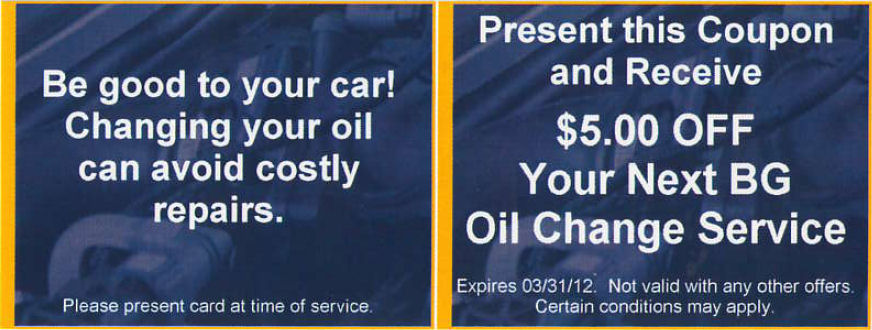
Click this coupon and print it for a $5 discount on your next oil change at Plantation Tune Tech An oil change at Plantation Tune Tech is better than another shop’s because we use BG products. In automotive, industrial, and heavy-equipment applications, the products of BG have shown themselves to be innovative, well made, protective of the environment, and attuned to the task at hand. They perform as promised. They do the job
Posted on 2/1/2012
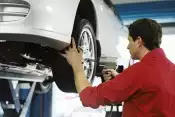
Winter sweaters and boots have been packed away in favor of shorts and sandals. Has your vehicle benefited from the same maintenance you've performed on your closets? Warm weather means long weekend getaways and even longer vacation road trips, and taking the time to perform seasonal maintenance today can help avoid trouble later. Here are 10 tips for spring and summer car care. In some cases, you'll be able to perform these procedures yourself. Others are best done by a mechanic as part of a tune-up. Some will help your vehicle look better. Most will help it perform more efficiently and get better gas mileage. Get rid of road salt on the undercarriage.Road salt can damage your vehicle by eating away at its undercarriage. Use a garden hose with as much water pressure as your system can muster to loosen winter grime and salt. Or, if you have a movable lawn sprinkler that's low enough, set that under the vehicle to wash away what you can't reach. Check the tires.Tire pres ... read more
Posted on 1/9/2012
Keep your car running! Watch for Engine Warning Signs It's OK to drive your car short distances with certain warning lights illuminated or gauges out of their normal range, but there are three that you dismiss at your car's peril: the engine oil light, the engine temperature gauge and the brake light. A few minutes of an excessively hot engine or low oil pressure and the groceries you're hauling in the back could suddenly be worth more than your car. A couple of minutes with the brake light on and you might end up playing bumper cars with the Cadillac Escalade ahead of you. The one being driven by Tony Soprano. In a bad mood. Get in the habit of glancing at your engine's temperature gauge and warning lights. If the idiot lights come on, pull over as soon as it's safe to do so and shut off the engine. You might just save yourself an expensive engine rebuild Do Your Regular Maintenance Skipping regularly scheduled maintenance intervals is one of the quickest ways to a ... read more
Posted on 1/2/2012
Driving! Wow. Is that "check engine" light on again? Didn't you just have that looked at? Come to think of it, your car is approaching that age, isn't it? A bit more grumble in the engine, a touch more sway in the suspension - you hate to admit it, but every time you take old faithful into the shop, the same thought tickles the back of your brain: Is it time for a replacement? How much is too much to spend on repairs? It's a question we've all had to ask at one point or another. Perhaps it would help to have a basic sense of what auto maintenance typically costs over time. The average American household owns 1.9 vehicles and spends around 1.5 percent of its annual income on auto repairs. In 2004, the standard family unit earned $54,453, which means they laid out around $817 annually on repairs, or $408 per vehicle. That number does not include the 3.7 percent spent on gasoline and motor oil ($1,007 per car), or the 2.2 percent ($599 per car) shelled out for insurance [sourc ... read more